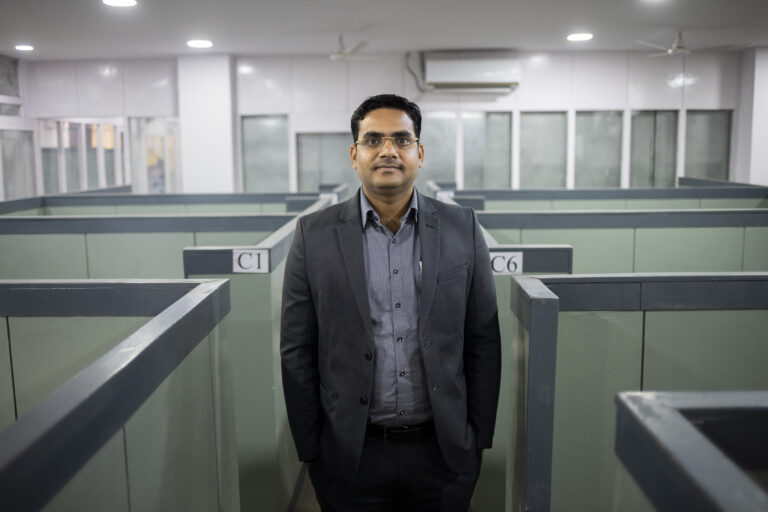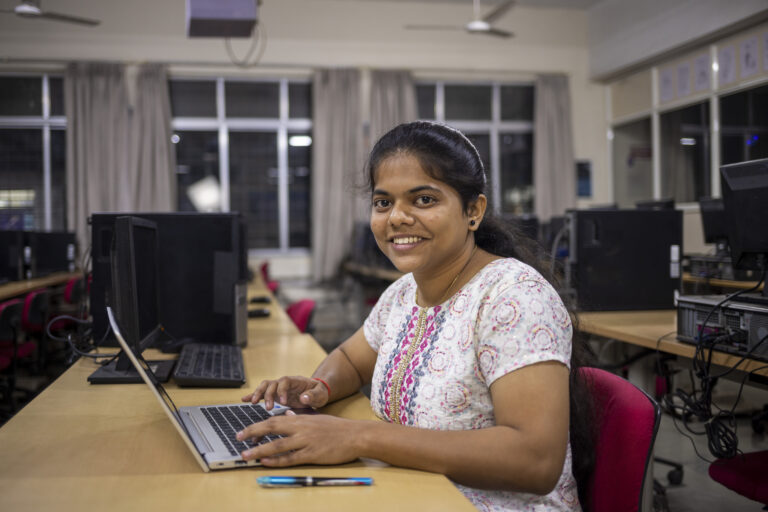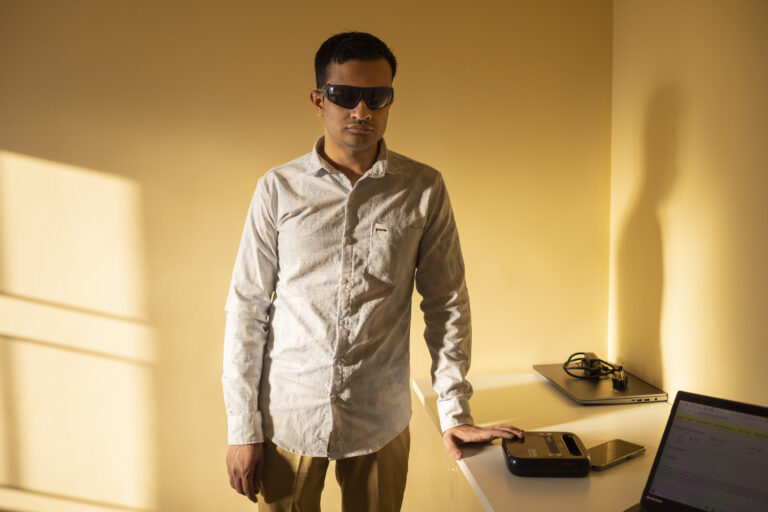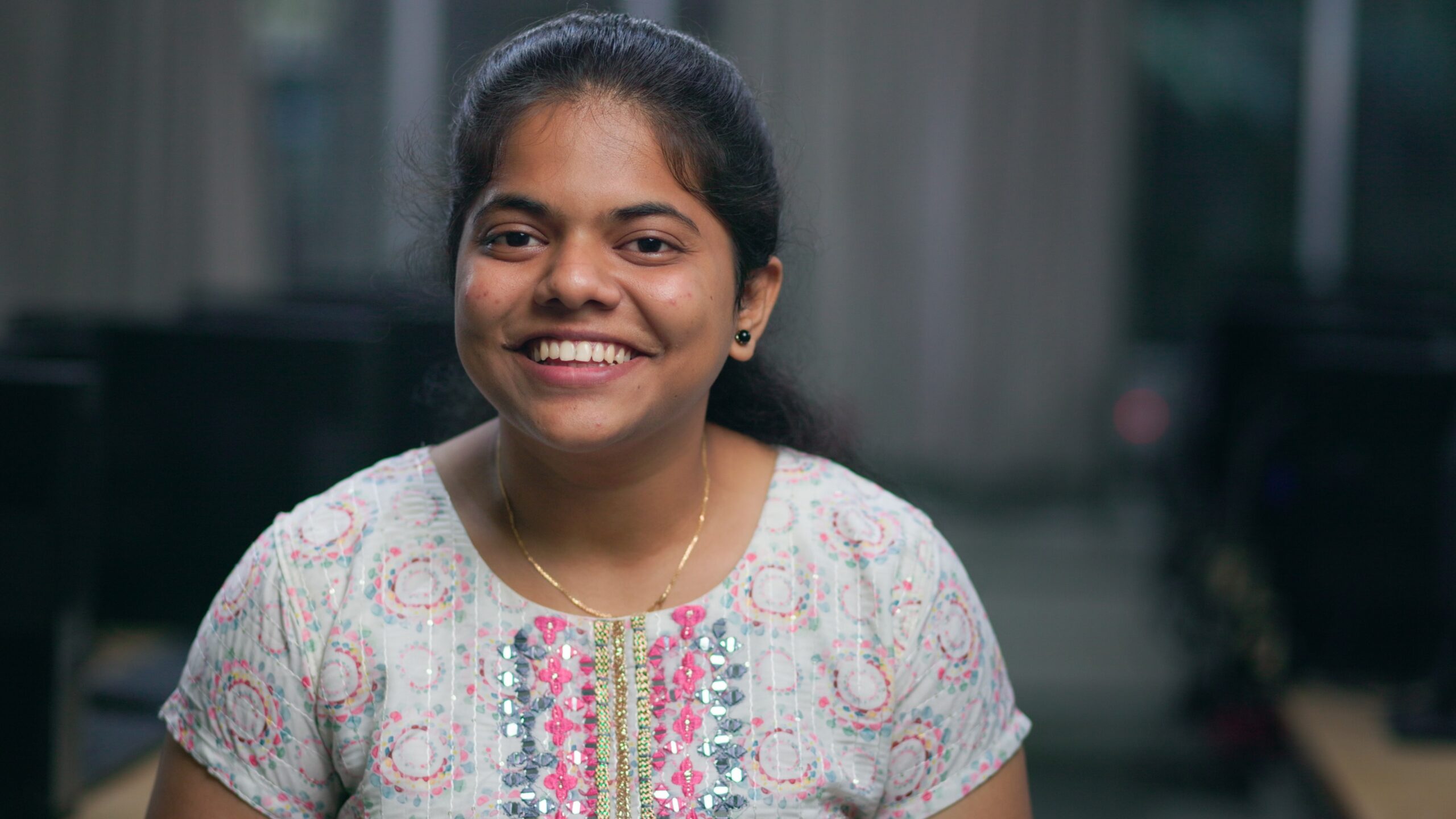
From civil servants to college students, Indians are getting trained in AI tools for work and life
Read this story in Hindi
As AI tools make their way into the workplace, they have the potential to create new opportunities for workers everywhere. But only if people know how to take advantage of them.
Over the next five years, Microsoft will partner with ministries, state governments and NGOs to train ten million Indians in AI skills under its ADVANTA(I)GE INDIA initiative – fueling productivity and opening doors to jobs.
The initiative builds on a previous program of the same name that has skilled 2.4 million Indians, from civil servants to college students to people with disabilities.
“Our aim is to not only enhance employability but also bridge the digital divide and create a more inclusive future for every Indian,” said Puneet Chandok, president of Microsoft India and South India.
Those involved in the program say that as the use of AI tools spreads across the workforce, those who don’t learn how to use them risk falling behind.
Neha Jain is an Indian Administrative Service Officer who is currently Special Secretary, IT & Electronics, Government of Uttar Pradesh, where government officers are undergoing AI training. “Once upon a time, humans discovered fire and were afraid of it. But then we learned to channelize it and put it to good use,” Jain said. “Similarly [AI] needs to be used wisely for the benefit of humanity, rather than letting us be devoured by it.”
We spoke to three beneficiaries across India:
Raghavendra Pratap Singh, 33, Hardoi, Uttar Pradesh

Raghavendra Pratap Singh, a civil servant in Uttar Pradesh, uses AI to draft official letters for policy implementation. Photo by John Brecher for Microsoft.
Raghavendra Pratap Singh’s job title is Review Officer in the state government of Uttar Pradesh. Essentially, he reviews and analyzes new policies then helps disseminate them to the local officers responsible for carrying them out.
He writes a lot of letters…seven or eight each day. A few months ago, his job got easier with AI tools.
Singh used to pick up a highlighter pen and go through perhaps 25 pages of dense policy to pick out bullet points. He then typed letters to various officers, details varying by relevance, printed each and put them in a file which was then hand-delivered to higher-ups for approval before being sent out.
A few months ago, Singh attended a one-day digital skills course run by Microsoft together with the state IT agency. There he learned tools like Microsoft Copilot and Copilot for Word, PowerPoint and Excel as well as OpenAI’s ChatGPT.
Since then, he has started using AI tools to summarize documents and draft letters. A letter that might have taken one hour to draft now takes 40 to 45 minutes, he said. After all, he still has to bring his own analysis and expertise to the table.
“AI makes it a better letter,” he said. In the past, he might sometimes miss a minor point. “Now AI is getting the exact pointers,” he said.
He also uses AI to translate court orders in English to Hindi so he can understand them better and communicate them to other officers.
The digital skills course facilitated by Microsoft and the Uttar Pradesh Development Systems Corporation (UPDESCO), the agency in charge of IT, and run by a social enterprise called AISECT, covers AI, digital productivity and cybersecurity – in a single day.
“We have kept this very purposefully on how government officers can use it,” said trainer Ateet Dixit. More time is spent covering AI for drafting letters and documents, rather than, say, AI for creating videos, which a government officer might have less use for.
“Some people don’t even know what AI is. We have to introduce from the start,” Dixit said. “They love it when they see the result. It’s useful for them. They save so much time.”
Singh said he likes the AI tools so much he has started using them in his personal life. Recently, he typed the prompt “wedding day wish message for friend.” The message read: “Congratulations on your wedding day! Wishing you both a lifetime filled with love, laughter and endless happiness,” which he sent to the happy couple.
Jui Shrikant Bidaye, 21, Pune

Jui Shrikant Bidaye, a student at Pune University, uses AI tools for debugging and troubleshooting while working as an intern at a technology consulting company. Photo by John Brecher for Microsoft.
As a child, Jui Shrikant Bidaye dreamed of becoming a professional player of kabbadi, the ancient Indian team sport.
Her parents, a bank manager and a homemaker, suggested she might have more career options in technology.
Bidaye was a fan of video games so it didn’t take much to turn her competitive energies in that direction. After graduating high school in rural Devgad, in Maharashtra, she headed more than 200 miles away to study for a Bachelors in Information Technology at NBN Sinhgad School of Engineering, part of the University of Pune.
Being away from home took some getting used to at first. She remembers being homesick for her mother’s cooking. “It was a little bit hard for me,” she said. “But I wanted to complete my dream.”
The university’s training and placement officer suggested she participate in TechSaksham, an initiative by Microsoft and SAP that introduces students to AI tools like Microsoft Copilot and OpenAI’s ChatGPT and programming languages such as Python and Java. She credits that experience, which included mock interview training, with helping her land a coveted internship in Bengaluru with Genpact, a digital technology consulting company that operates globally.
“They liked my technical knowledge in the interview,” she said.
She is spending the six-month internship working on creating a secure file storage application, using AI tools to help. “I use it for debugging and troubleshooting,” she said. “It gives me very quick answers and is very exact.”
She drew on concepts she learned at TechSaksham such as how to create application program interfaces (APIs), and included security features such as requiring admin approval to add users and created different interfaces so users could not see what others were doing.
She hopes the internship will translate into a permanent job offer when she graduates college in June 2025. She has a younger brother whom she feels some responsibility for and wants him to have a good education. She also has a role model– her sister, who is three years older and working for a multinational technology company.
“I want to become like her,” she said. “An independent lady.”
Venkatesh Deshpande, 31, Bengaluru

Venkatesh Deshpande, a schools coordinator for Vision Empower in Bengaluru, uses AI to help create lesson plans for teachers at schools for students with low vision. Photo by John Brecher for Microsoft
Venkatesh Deshpande, who was born blind, used to keep currency of different denominations – 100 rupees, 500 rupees and so on– in different pouches so he could keep track of what was what.
No longer. Now he simply whips out his phone, points the rear camera, and Microsoft Seeing AI app tells him what denomination it is.
“I use AI tools to be more independent today, as I don’t want to always be dependent on my friends and family members,” he said.
AI tools like Seeing AI and Be My AI also help Deshpande with his work as a school coordinator with Vision Empower, a non-profit organization that promotes STEM education for those who are blind or have low vision. That includes how to use digital tools to learn, work and simply go about their daily lives.
Deshpande was born in the city of Bagalkote in the north of Karnataka state. He was, he said, “completely blind. I can feel sunlight hitting my face but can’t see the light.”
When it was time for him to go to school, his entire family including siblings moved to Bengaluru, the state capital, so he could attend the Sri Rakum School for the Blind. He went on to earn a Bachelor of Arts in History, Political Science and Sociology from Bangalore University and briefly taught at another school for the blind until the pandemic closed it down.
In 2020, he joined Vision Empower, founded by a young activist named Vidhya Y., who is famous for being the first student who was blind to earn a Masters at the prestigious International Institute of Information Technology in Bengaluru.
Deshpande first learned about AI tools like Seeing AI and Be My AI from Vidhya Y., who was also a research fellow at Microsoft Research India. He now uses AI to help develop lesson plans for teachers in more than 140 schools serving students with disabilities in 14 states across India.
For example, he recently used AI to look up computing hardware terms and concepts for a digital literacy lesson – monitor, keyboard and so on, then to translate the English terms into Kannada, the language of Karnataka state.
“The teachers are very enthusiastic,” he said. “We get very good interest.”


